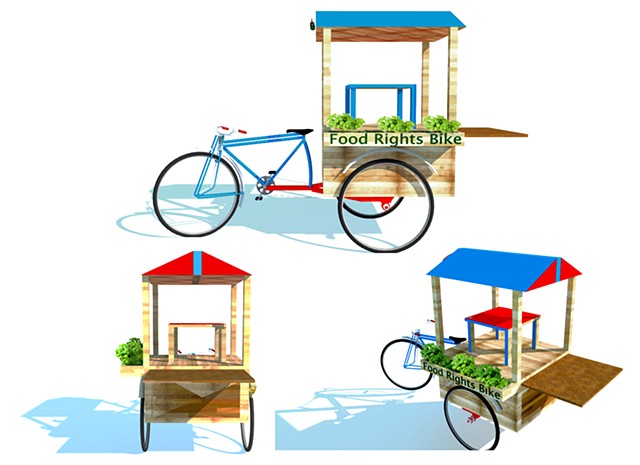Food Rigths Bike
Despite Nashville’s economic growth, its residents, as in other booming cities, continue to have uneven access to nutritious and affordable foods. Juan William Chávez calls attention to food-access problems through his project, Food Rights Bike. The artist has repurposed a bicycle rickshaw that he inherited from his grandfather and transformed it into a mobile sculpture for food distribution and education. The rickshaw passenger seat has been replaced with a farm stand for growing and carrying fresh produce. With a built-in, pull-out table, the sculpture also functions as an urban-garden workstation, a platform for cooking demonstrations or art and gardening workshops, and an iconic information hub at community events. The back of the sculpture features a canvas map of Nashville, to aid conversations about where food is located and who can reach it.
Designed to be used by an organization invested in food justice, this summer the Food Rights Bike is on loan to the West Nashville Dream Center, where it will support and amplify the food supplementation programs. Surveys show that buying groceries can take three to five hours roundtrip for residents of this under-resourced neighborhood. The Center helps to alleviate these challenges through food rescue and distribution programs, a community garden, an animal farm, and other resources.
Community Partner
West Nashville Dream Center (4007 Delaware Ave., Nashville, TN 37209) is a dynamic ministry committed to protecting and empowering people who are living in distress in the community. The Center’s goal is to improve the safety and quality of life in surrounding neighborhoods by providing supplemental resources that meet physical, emotional, and spiritual needs for neighbors of all ages.
Build Better Tables is a temporary public-art exhibition focusing on food issues to examine urban development and understand the effects of gentrification on community health and wellness. Presented by Metro Arts: Nashville Office of Arts and Culture, nine projects by local and national artists are placed at publicly accessible sites across the city, from bus stops to community centers to church lawns, advancing the aim of Metro Arts for every Nashvillian to experience a creative city. The artists’ projects include an outdoor bread oven and neighborhood hearth, a bicycle rickshaw for fresh-produce delivery and food education, seed libraries promoting community action for food sovereignty, brass-and-sugar sculptures concerning Black maternal mortality, and eating events that address the role of food in discriminatory development. Together, they prompt a critical look at the social and economic forces that influence food access and culture.
